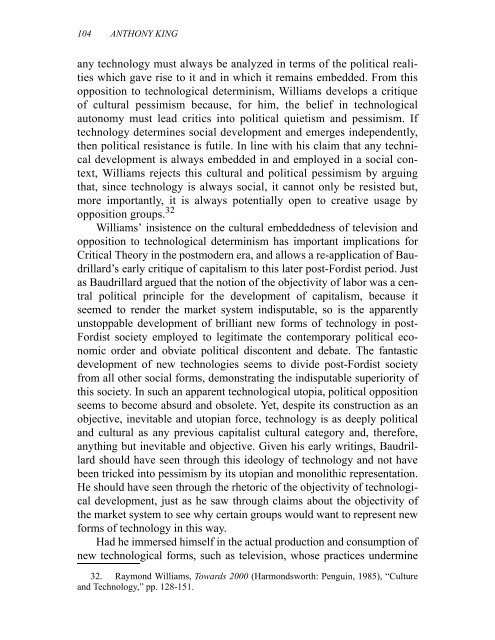King Baudrillard Telos.pdf - Exeter Research and Institutional ...
King Baudrillard Telos.pdf - Exeter Research and Institutional ...
King Baudrillard Telos.pdf - Exeter Research and Institutional ...
You also want an ePaper? Increase the reach of your titles
YUMPU automatically turns print PDFs into web optimized ePapers that Google loves.
104 ANTHONY KING<br />
any technology must always be analyzed in terms of the political realities<br />
which gave rise to it <strong>and</strong> in which it remains embedded. From this<br />
opposition to technological determinism, Williams develops a critique<br />
of cultural pessimism because, for him, the belief in technological<br />
autonomy must lead critics into political quietism <strong>and</strong> pessimism. If<br />
technology determines social development <strong>and</strong> emerges independently,<br />
then political resistance is futile. In line with his claim that any technical<br />
development is always embedded in <strong>and</strong> employed in a social context,<br />
Williams rejects this cultural <strong>and</strong> political pessimism by arguing<br />
that, since technology is always social, it cannot only be resisted but,<br />
more importantly, it is always potentially open to creative usage by<br />
opposition groups. 32<br />
Williams’ insistence on the cultural embeddedness of television <strong>and</strong><br />
opposition to technological determinism has important implications for<br />
Critical Theory in the postmodern era, <strong>and</strong> allows a re-application of <strong>Baudrillard</strong>’s<br />
early critique of capitalism to this later post-Fordist period. Just<br />
as <strong>Baudrillard</strong> argued that the notion of the objectivity of labor was a central<br />
political principle for the development of capitalism, because it<br />
seemed to render the market system indisputable, so is the apparently<br />
unstoppable development of brilliant new forms of technology in post-<br />
Fordist society employed to legitimate the contemporary political economic<br />
order <strong>and</strong> obviate political discontent <strong>and</strong> debate. The fantastic<br />
development of new technologies seems to divide post-Fordist society<br />
from all other social forms, demonstrating the indisputable superiority of<br />
this society. In such an apparent technological utopia, political opposition<br />
seems to become absurd <strong>and</strong> obsolete. Yet, despite its construction as an<br />
objective, inevitable <strong>and</strong> utopian force, technology is as deeply political<br />
<strong>and</strong> cultural as any previous capitalist cultural category <strong>and</strong>, therefore,<br />
anything but inevitable <strong>and</strong> objective. Given his early writings, <strong>Baudrillard</strong><br />
should have seen through this ideology of technology <strong>and</strong> not have<br />
been tricked into pessimism by its utopian <strong>and</strong> monolithic representation.<br />
He should have seen through the rhetoric of the objectivity of technological<br />
development, just as he saw through claims about the objectivity of<br />
the market system to see why certain groups would want to represent new<br />
forms of technology in this way.<br />
Had he immersed himself in the actual production <strong>and</strong> consumption of<br />
new technological forms, such as television, whose practices undermine<br />
32. Raymond Williams, Towards 2000 (Harmondsworth: Penguin, 1985), “Culture<br />
<strong>and</strong> Technology,” pp. 128-151.
















